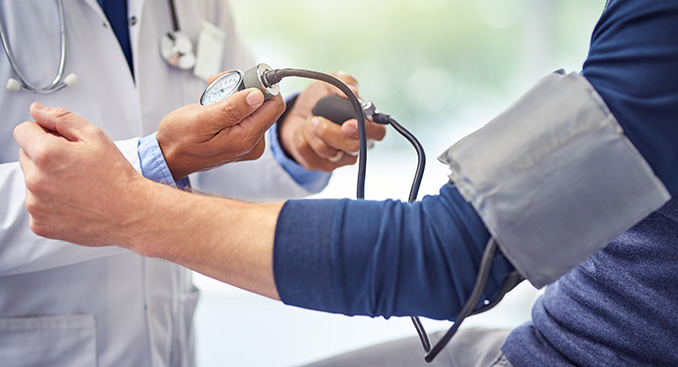Why and How to Manage Hypertension

Your circulatory system works hard, constantly getting freshly oxygenated blood from your heart to your tissues and organs. If you don't take care of it, it cannot perform at its peak.
In an average human lifetime, the heart beats about 2.5 billion times. Each beat forces blood through blood vessels, including arteries, veins and capillaries. The pressure of the blood going up against the walls of vessels is called blood pressure.
When blood pressure is too high — a condition called hypertension — the heart and blood vessels have to work harder and are less efficient, according to the American Heart Association. The arteries end up damaged, cholesterol forms plaque inside the artery walls and the space inside arteries shrinks. Hypertension can lead to other serious problems, including stroke, vision loss, heart attack and kidney failure.
While high blood pressure sometimes requires treatment with medicine, the best way to improve outcomes and overall health is to work with a doctor to make lifestyle changes. These include quitting smoking, limiting alcohol consumption, getting regular exercise and eating a healthy diet.
The most important change you can make to regulate your blood pressure is in how you eat,” says Stephen Lewis, MD, an interventional cardiologist and certified hypertension specialist at TriHealth Heart Institute. “There are two similar diets that are particularly effective in improving blood pressure.”
The Mediterranean diet, a style of eating followed by people living in countries around the Mediterranean, has helped people improve their health, according to Healthline. It includes vegetables, fruits, nuts, seeds, legumes, potatoes, whole grains, breads, herbs, spices, fish, seafood and extra virgin olive oil, with poultry, eggs, cheese and yogurt in moderation and a low consumption of red meat.
Developed for people with high blood pressure, the DASH (dietary approaches to stop hypertension) eating plan, similar to the Mediterranean diet, emphasizes whole grains, fruits and vegetables and low-fat dairy, fish, poultry, beans, nuts and oils, according to the National Heart, Lung and Blood Institute. It limits foods high in saturated fat and sugar-sweetened drinks and treats.
These two ways of eating “help people get on track by eliminating red meat, too much processed dairy, meat, cheese – which has high amounts of salt – and things in boxes and cans," Lewis said. "It gets them away from the processed foods and toward eating more fresh fruits and vegetables."
It may be a challenge to make changes, but these diets lead to being healthier, Lewis said. In follow-up visits, his patients have said they simply feel better.
"Then it's a lot easier for them to continue because they’re getting positive reinforcement," he said. "This is actually eating to feel good."
While medicine is helpful, if you’re not eating healthy, your blood pressure can be resistant to multiple medications, Lewis said. Some over-the-counter medicine should be avoided. For example, non-steroidal anti-inflammatory drugs “have a negative effect on blood pressure and can interact with some of the blood pressure medications," he said. "They don’t work as effectively."
Dr. Lewis says exercise can also lower blood pressure a modest amount, particularly when it’s cardiovascular exercise that elevates the heart rate to anywhere between 70 and 85 percent of the predicted maximum heart rate.
Additionally, he says sleep habits contribute to cardiovascular health. Getting enough sleep is important, as people who have poor sleep habits, untreated sleep apnea, restless leg syndrome or other sleep disorders will experience added stress on their systems.
If you have been diagnosed with hypertension, you should regularly visit your doctor, and check your blood pressure at home. Dr. Lewis says he encourages patients to take their blood pressure daily until they are stable, and then a couple times a week. To ensure your blood pressure cuff works correctly, compare